The internet can be a hostile place for website owners and users alike, with bots spamming forms, hacking accounts, and scraping data. To keep these threats at bay, websites use tools like CAPTCHA and its advanced version, Google reCAPTCHA.
CAPTCHA, short for “Completely Automated Public Turing Test to tell Computers and Humans Apart,” creates a barrier that distinguishes real users from automated bots. You’ve likely solved one by identifying traffic lights or typing distorted words.
However, as a website owner, you may wonder: what data does reCAPTCHA collect to make its decisions, and how does that align with your users’ privacy?
This is where privacy policies, including a privacy policy clause for reCAPTCHA, become essential. They outline what happens to this collected information and ensure your practices remain transparent and compliant with legal standards.
Below, I’ll explore how reCAPTCHA works, what data it gathers, and how privacy policies can protect your users’ information while keeping your website or app secure. By understanding these aspects, you’ll be better equipped to balance security with user trust on your site.
- Transparency about data collection and compliance with global privacy laws like GDPR and CCPA encourage trust and avoid legal penalties.
- Google mandates that third parties using reCAPTCHA must disclose how information is collected and that it’s only used for security purposes.
- Displaying a clear and accessible privacy policy is critical for legal compliance and maintaining user trust.
Table of Contents
PRO TIP: Take the hassle of writing your own privacy policy away with our privacy policy generator trusted by over 200,000 businesses. It’ll save you hours of work and possible costly legal mistakes.
What is a Privacy Policy Clause for reCAPTCHA?
A reCAPTCHA clause in a privacy policy explains how the reCAPTCHA system collects, uses, and stores data when users interact with it on your website.
It ensures transparency and helps you comply with privacy laws like the General Data Protection Regulation (GDPR) or California Consumer Privacy Act (CCPA) by outlining the types of data collected and the purpose of its collection.
Google reCAPTCHA gathers information to determine whether a user is a human or a bot. To verify human activity, it analyzes a broad range of data points, including:
- IP Address: Tracks the location of the user.
- Mouse Movements and Clicks: Observe how a user interacts with the webpage.
- Device Information: Captures details about the operating system, browser type, and screen resolution.
- Cookies: Checks if a user has interacted with Google services before.
- Time Spent: Measures how long a user spends on the page.
Google uses this data in combination with machine learning algorithms to make decisions about user authenticity.
Why is a reCAPTCHA Clause in Your Privacy Policy Important?
A reCAPTCHA clause is important because it informs users about the data collected through reCAPTCHA and ensures compliance with privacy laws worldwide.
Transparency about data collection promotes trust with your users while protecting your website or mobile app from potential legal consequences.
PRO TIP: Use plain, non-technical language in your privacy policy to ensure all users, regardless of technical expertise, can understand your data practices.
Privacy regulations worldwide demand that websites disclose how they collect, use, and store user data. Failure to comply can lead to severe penalties, not to mention reputational damage. Here’s how major privacy laws affect your obligations:
- GDPR (European Union): GDPR requires websites to provide clear and detailed explanations of their data collection practices. It mandates that users must give explicit consent before their data is collected. Violations can result in fines up to €20 million or 4% of global annual revenue, whichever is higher.
- CCPA (United States): The CCPA obliges businesses to inform users about the data being collected and allows users to opt out of data collection. Websites that fail to comply risk fines of up to $7,500 per violation.
- Personal Information Protection and Electronic Documents Act (PIPEDA – Canada): PIPEDA emphasizes the need for meaningful consent and requires websites to be transparent about data collection. Non-compliance can lead to fines of up to $100,000 per violation.
- Australia Privacy Act: Under Australia’s Privacy Act 1988, businesses must clearly outline how personal information is handled. Serious breaches can lead to penalties of up to $2.5 million AUD.
A well-documented privacy policy provides clarity to users, reducing the likelihood of complaints or legal disputes.
For instance, in a recent Cisco Consumer Privacy Survey, 87% of respondents said they care about their privacy and want more control over how their data is used.
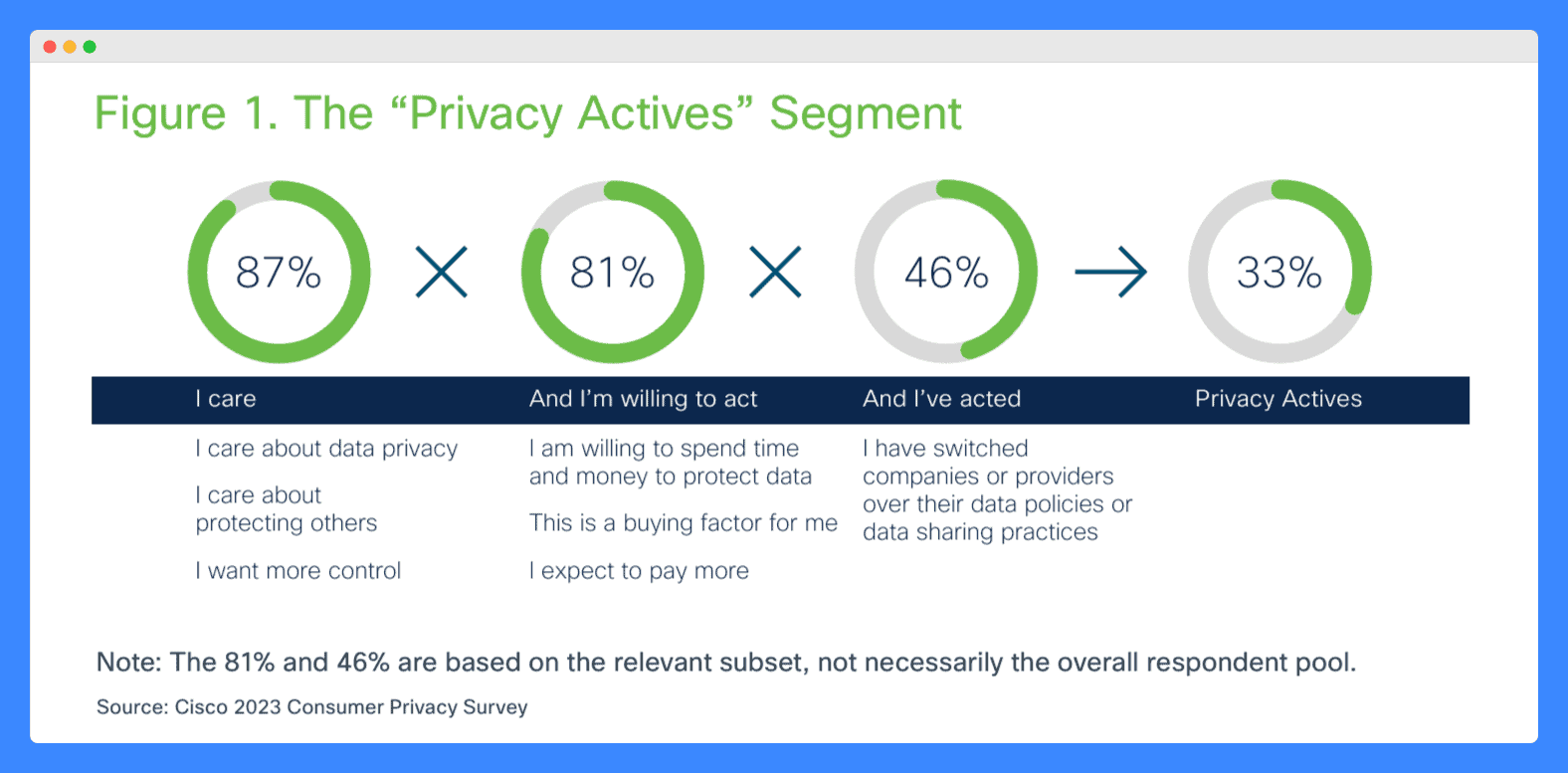
Transparency can enhance trust and engagement, which is especially important in an era of increasing data breaches and online scams.
Rules to Follow When Using ReCAPTCHA on Your Website
Using Google reCAPTCHA on your website is not just about implementing a security measure, it’s about doing so in a way that complies with Google’s policies and privacy laws around the world.
Let’s break down the requirements clearly so you can stay compliant and protect your users’ trust.
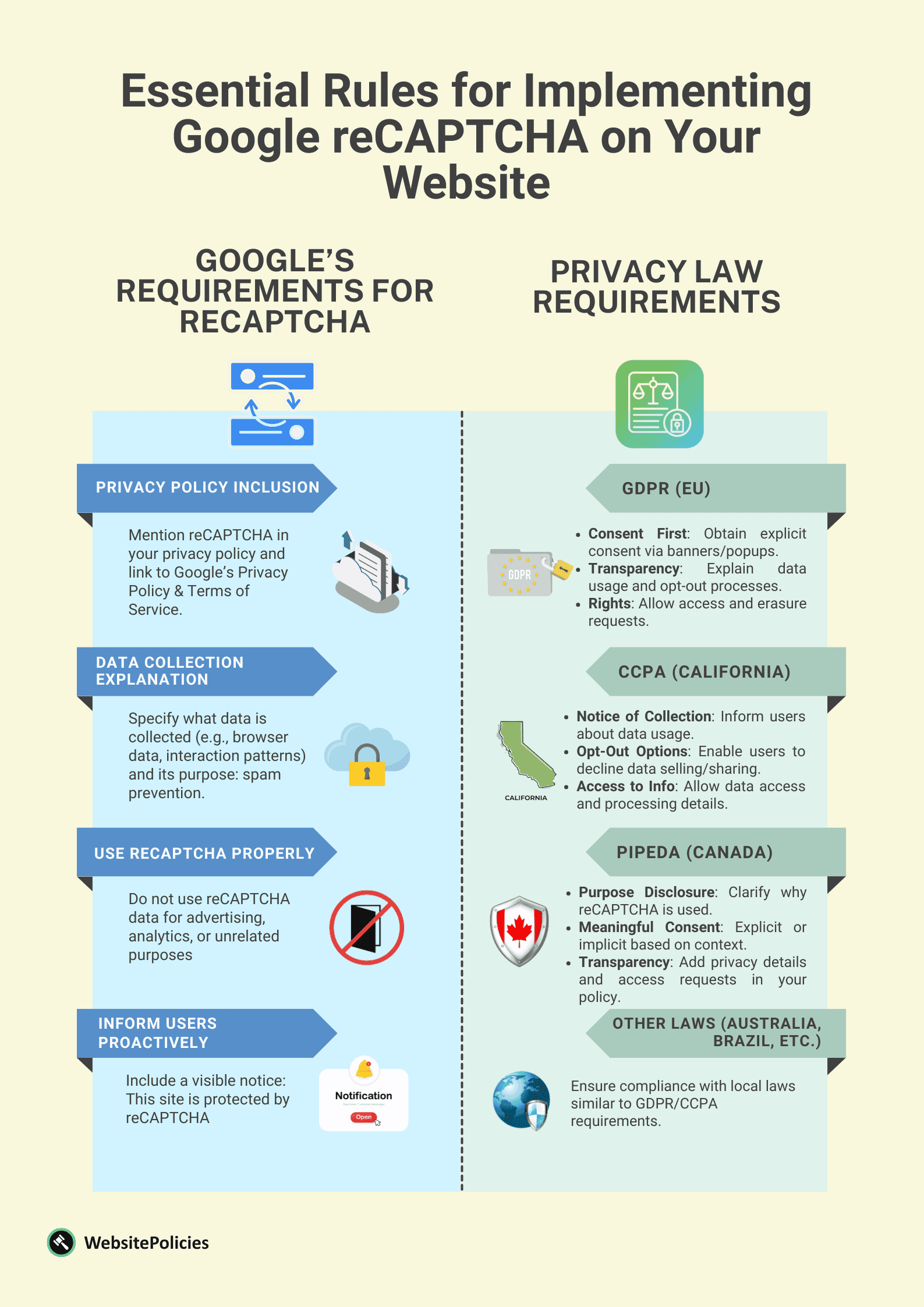
Google’s Requirements for reCAPTCHA
Google provides clear guidelines for how you must disclose the use of reCAPTCHA on your website. Failing to meet these standards can result in penalties, including suspension of reCAPTCHA services.
Here’s what Google requires:
Include Google’s Privacy Policy and Terms of Service in Your Privacy Policy
Google reCAPTCHA is governed by its own Privacy Policy and Terms of Service. Your privacy policy must:
- State that your site uses reCAPTCHA to protect against spam and abuse.
- Link to Google’s Privacy Policy and Terms of Service so users can review how their data may be processed.
Explain Data Collection
Specify what information is collected and used, including data from the user’s browser window, device, and interaction patterns.
Make sure to specify that this data is collected for security purposes and is not used for marketing or profiling.
Use reCAPTCHA for Its Intended Purpose
Google explicitly prohibits the use of reCAPTCHA for anything other than preventing spam, bots, and abuse. Using the data collected for unrelated purposes, such as advertising or analytics, violates their terms of service.

Inform Users Before Collection Begins
In regions governed by laws like the GDPR, you may need to seek user consent before reCAPTCHA processes any data.

When I set up reCAPTCHA for my own projects, I prioritize informing users upfront to show respect for their privacy.
PRO TIP: Place a short notice like “This site is protected by reCAPTCHA” near forms or interactive features to inform users transparently.
Privacy Law Requirements
In addition to meeting Google’s rules, you must also comply with privacy laws in your region and any other regions where your website operates. Here’s a breakdown of key laws:
GDPR
The GDPR requires a high level of transparency and explicit consent for data collection:
- Consent: Before reCAPTCHA processes a user’s data, you must obtain explicit consent, often via a cookie banner or consent popup. Users must actively opt-in by clicking “Accept” or a similar action.
- Transparency: Your privacy policy must explain why the data is being collected, how it’s used, and how users can withdraw consent.
- Right to Access and Erasure: Users have the right to request access to the data collected and have it deleted.
CCPA
The CCPA applies to businesses operating in California or serving its residents:
- Notice of Collection: Inform users about what data is being collected through reCAPTCHA and for what purpose.
- Right to Opt-Out: Users must be given the ability to opt out of having their data sold or shared.
- Access to Information: Users can request details on how their data is processed.
PIPEDA
PIPEDA requires websites to obtain meaningful consent for data collection:
- Purpose: Clearly explain why reCAPTCHA is being used and what data it collects.
- Consent: Users must provide consent for the data collection (implicit or explicit, depending on the context).
- Transparency: Include a section in your privacy policy explaining how users can request access to or deletion of their data.
Other Laws
Laws such as Australia’s Privacy Act and the Brazilian General Data Protection Law or Lei Geral de Proteção de Dados (LGPD) mirror GDPR and CCPA requirements, emphasizing consent, transparency, and user rights.
What Happens If You Don’t Include a reCAPTCHA in Your Privacy Policy?
Failing to include a privacy policy with reCAPTCHA disclosures can lead to serious consequences for your website and business.
These consequences can range from legal penalties to damaged trust with your users, potentially affecting your site’s performance and reputation.
1. Legal Penalties and Fines
Privacy laws like GDPR, CCPA, and PIPEDA impose strict requirements for transparency in data collection. If your website collects data through tools like reCAPTCHA without informing users, you could face significant legal repercussions.
For businesses operating across multiple jurisdictions, these penalties can compound if your site is found in violation of laws in more than one region.
2. Loss of Access to Google reCAPTCHA Services
Google’s terms of service agreement for reCAPTCHA clearly requires that you disclose its usage and link to their Privacy Policy and Terms of Service. If you fail to do so, Google has the right to suspend or revoke your access to reCAPTCHA.
This could leave your website vulnerable to spam, abuse, and automated attacks, potentially increasing downtime and harming your reputation.
3. Loss of User Trust
I’ve seen how quickly trust erodes when websites fail to communicate their data practices. If users feel their privacy isn’t respected, they are more likely to:
- Stop using your website.
- Leave negative reviews or complaints online.
- File formal complaints with data protection authorities.
A poorly managed or missing privacy policy can damage your credibility and reduce customer retention.
4. Exposure to Security Risks
Without proper reCAPTCHA integration or compliance, your website may be more vulnerable to bots, spam, and other automated attacks. This can result in:
- Increased downtime.
- Compromised user data.
- Loss of revenue from frustrated or alienated users.
Users expect transparency and security to go hand in hand. A missing or incomplete privacy policy signals negligence, making users hesitant to trust your site.
Privacy Policy reCAPTCHA Clause Template
This privacy policy reCAPTCHA clause template provides a practical starting point for drafting your own privacy policy. It includes essential elements, such as disclosing the use of Google’s reCAPTCHA and explaining the types of data collected.
If your website has unique requirements or specific data collection practices, you may want to customize this template further to reflect your needs.
Many website owners find it helpful to use a privacy policy generator to save time and ensure their policy aligns with relevant laws and business operations. Generators simplify the process and reduce the risk of missing important details.
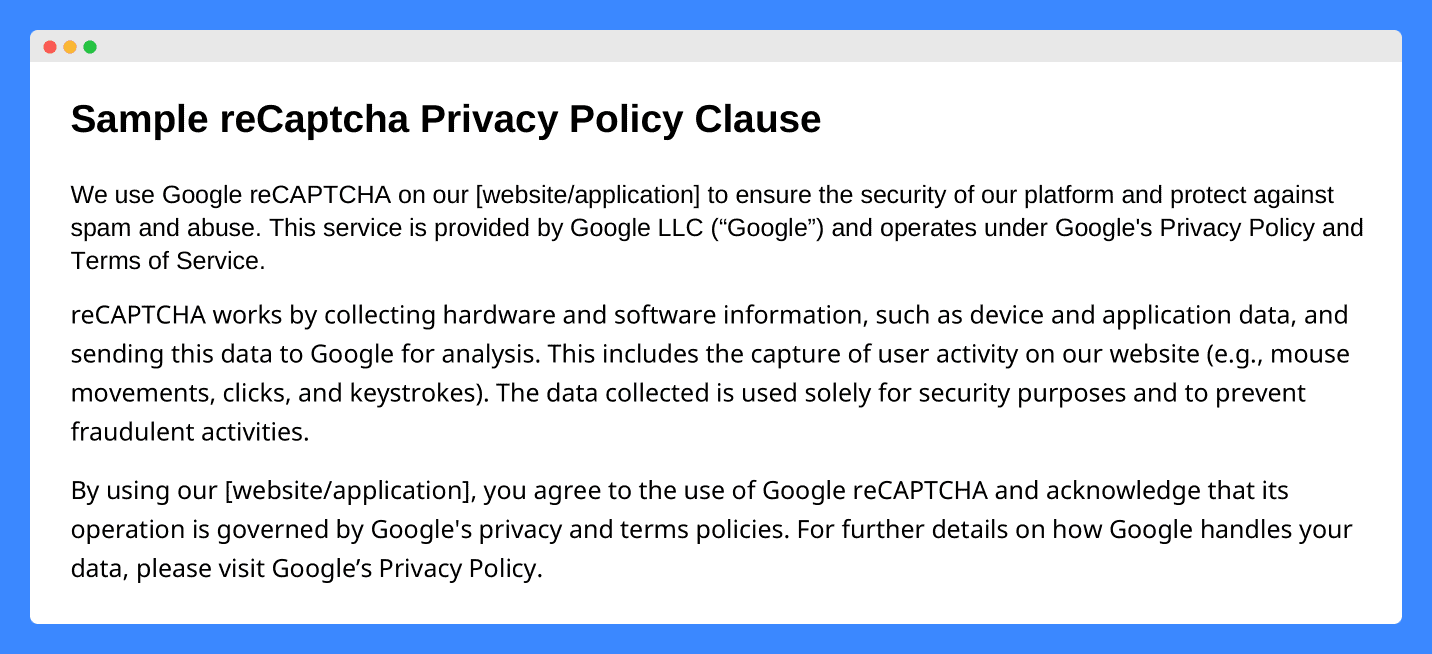
Use this template as a foundation, making sure to adjust it based on your specific practices and legal requirements.
Examples of reCAPTCHA Privacy Policies You Can Learn From
A privacy policy should inform users that your website uses tools like reCAPTCHA, along with other third-party services or cookies, to enhance security and functionality.
It’s also essential to clarify how your website collects data, both directly, such as through forms, and indirectly, like analyzing user interactions with the site.
Below are examples of websites that use reCAPTCHA and provide links to their privacy policies, which can offer valuable insights into crafting your own.
1. Medium
Medium provides a clear implementation of Google reCAPTCHA in its signup process, as shown in the screenshot.
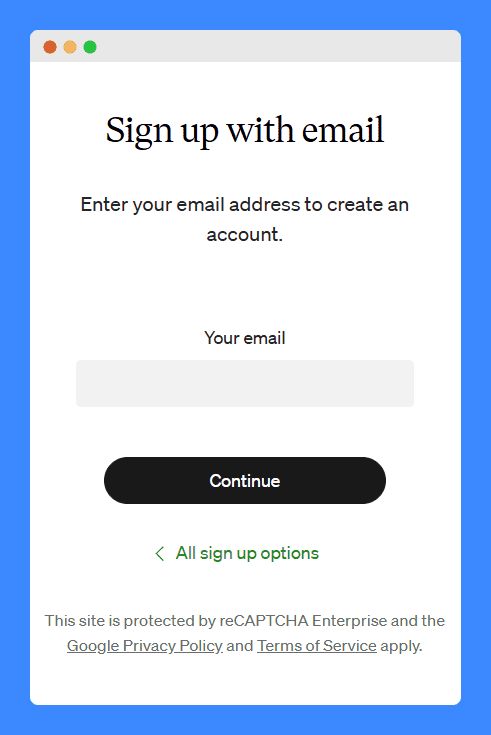
At the bottom of the signup form, there’s a short disclosure that fulfills Google’s requirement to inform users about the use of reCAPTCHA, while also linking to Google’s Privacy Policy and Terms of Service, which detail how user data is collected, processed, and stored.
2. Creative Commons
Creative Commons uses Google reCAPTCHA through an “I’m not a robot” checkbox on its “Contact CC” form to protect against spam and unauthorized submissions.
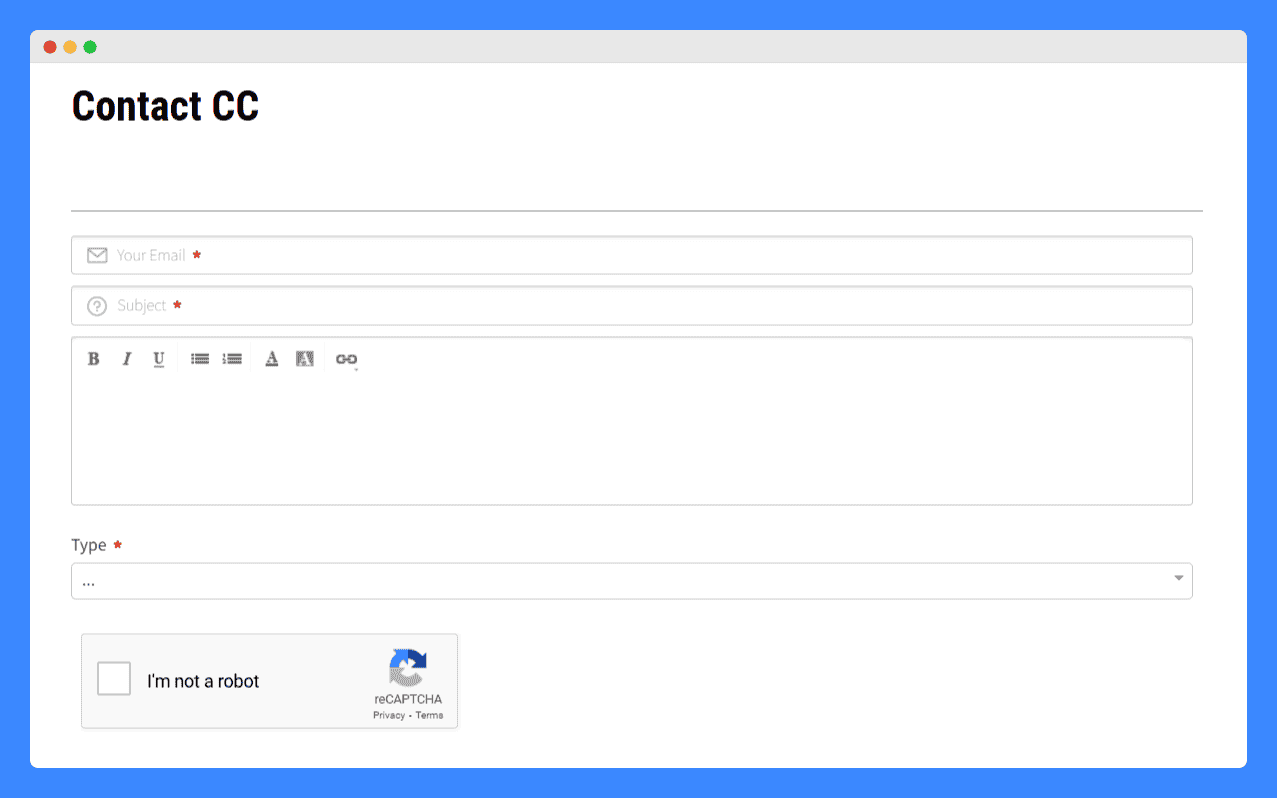
Their privacy policy explains the collection of personal information, such as IP addresses, device details, and interaction patterns, which are key elements also tied to reCAPTCHA’s functionality.
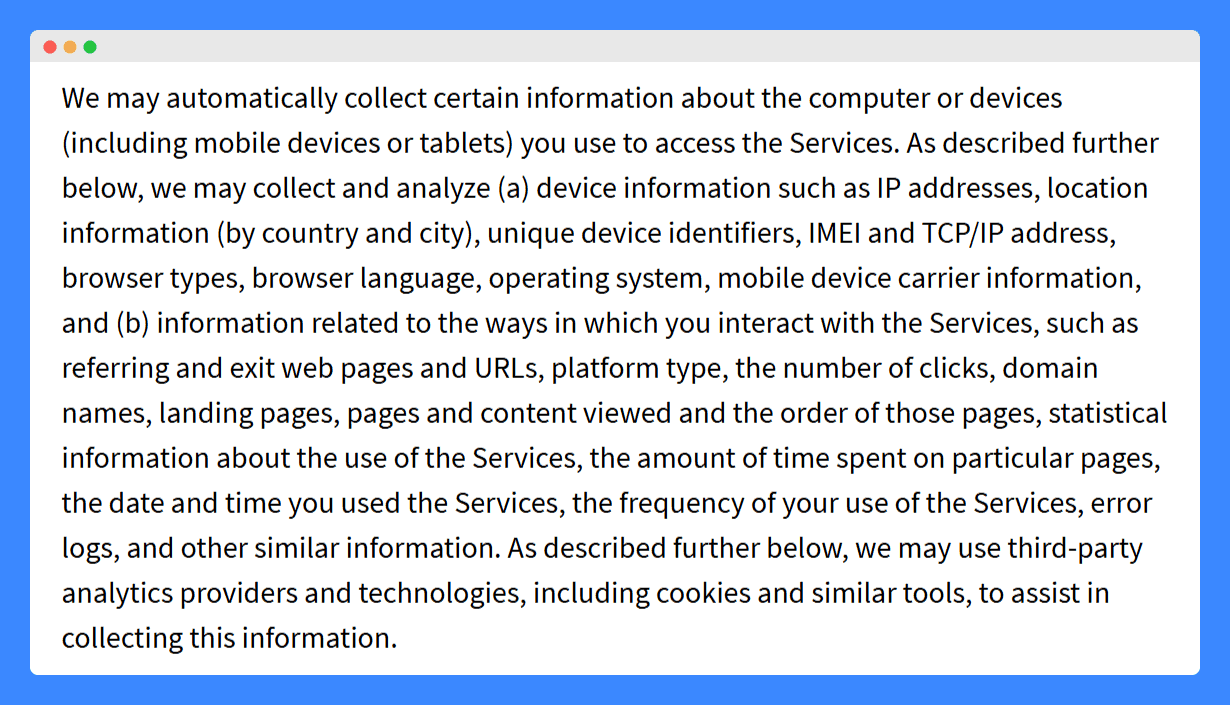
3. Quora
Quora uses Google reCAPTCHA during its sign-up process to enhance security by distinguishing genuine users from bots. The reCAPTCHA widget is displayed, along with links to Google’s Privacy Policy and Terms of Service.

Their privacy policy complements this by explaining how technologies like cookies and IP tracking collects data, which aligns with reCAPTCHA’s methods of analyzing user interactions for security purposes.
They also provided a link to their cookie policy so users can review the information in more detail.
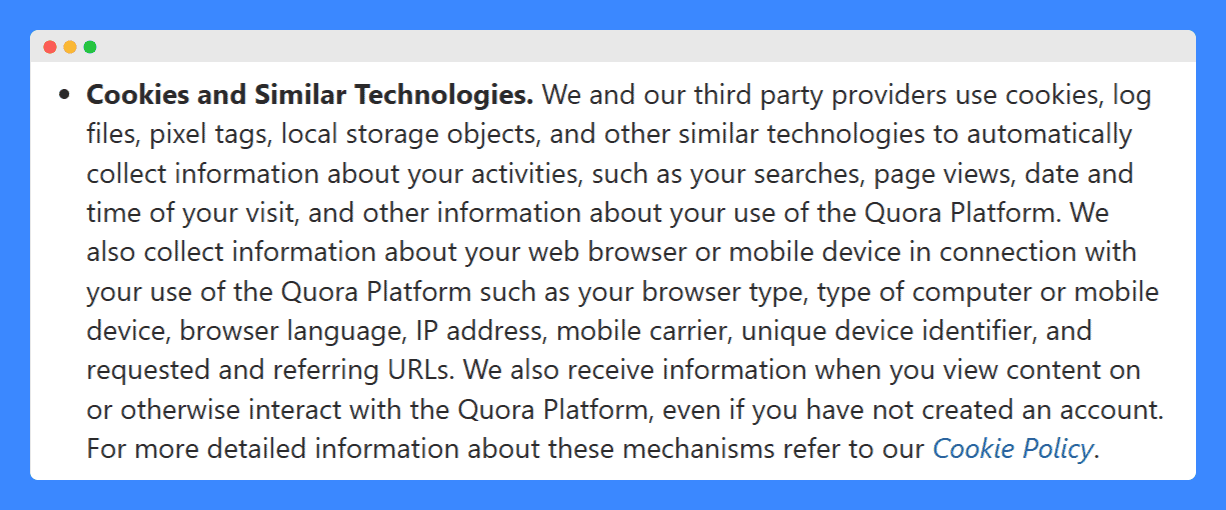
4. Weebly
Weebly, powered by Square, also incorporates Google reCAPTCHA into its sign-up process to ensure secure user registration.
The visible statement at the bottom of the form links to Google’s Privacy Policy and Terms of Service, meeting transparency requirements and informing users about data collection.
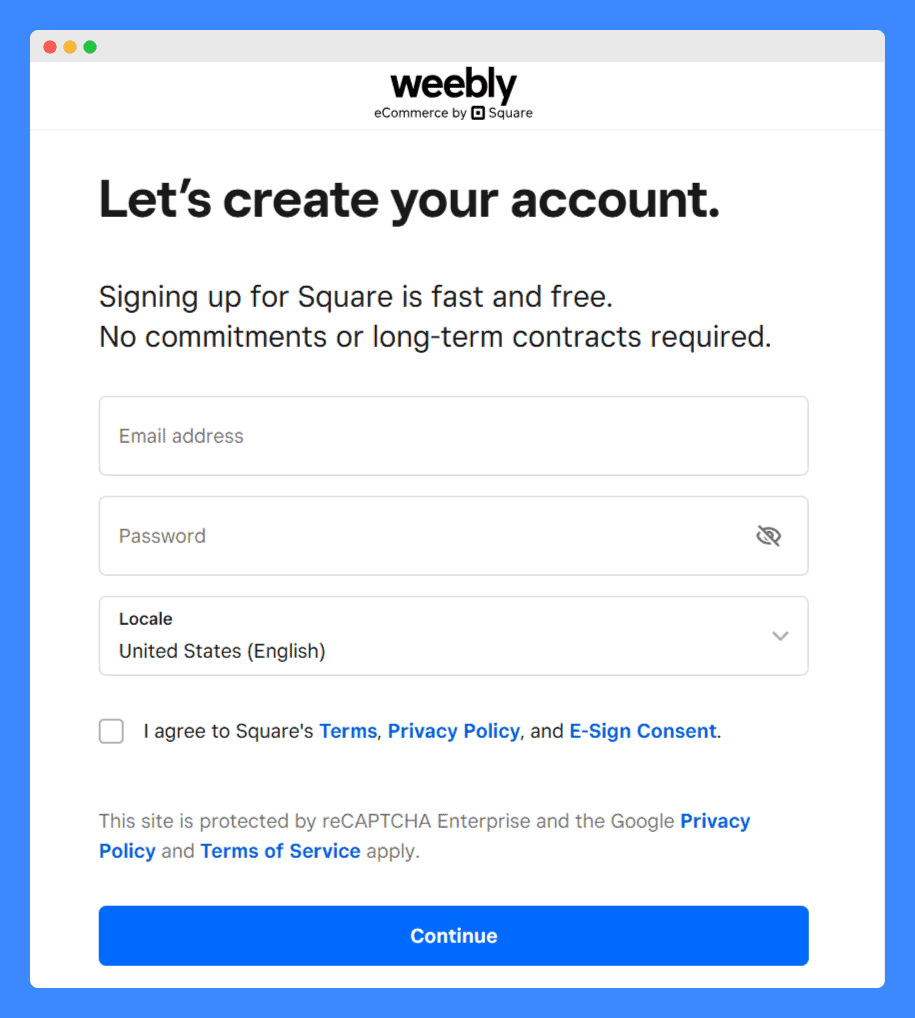
Weebly’s privacy policy further aligns with this by detailing users’ personal information rights, such as accessing, correcting, or deleting their data.
This complements reCAPTCHA’s role by emphasizing Weebly’s commitment to providing users with control over their data, a vital aspect of compliance with privacy laws like GDPR and CCPA.
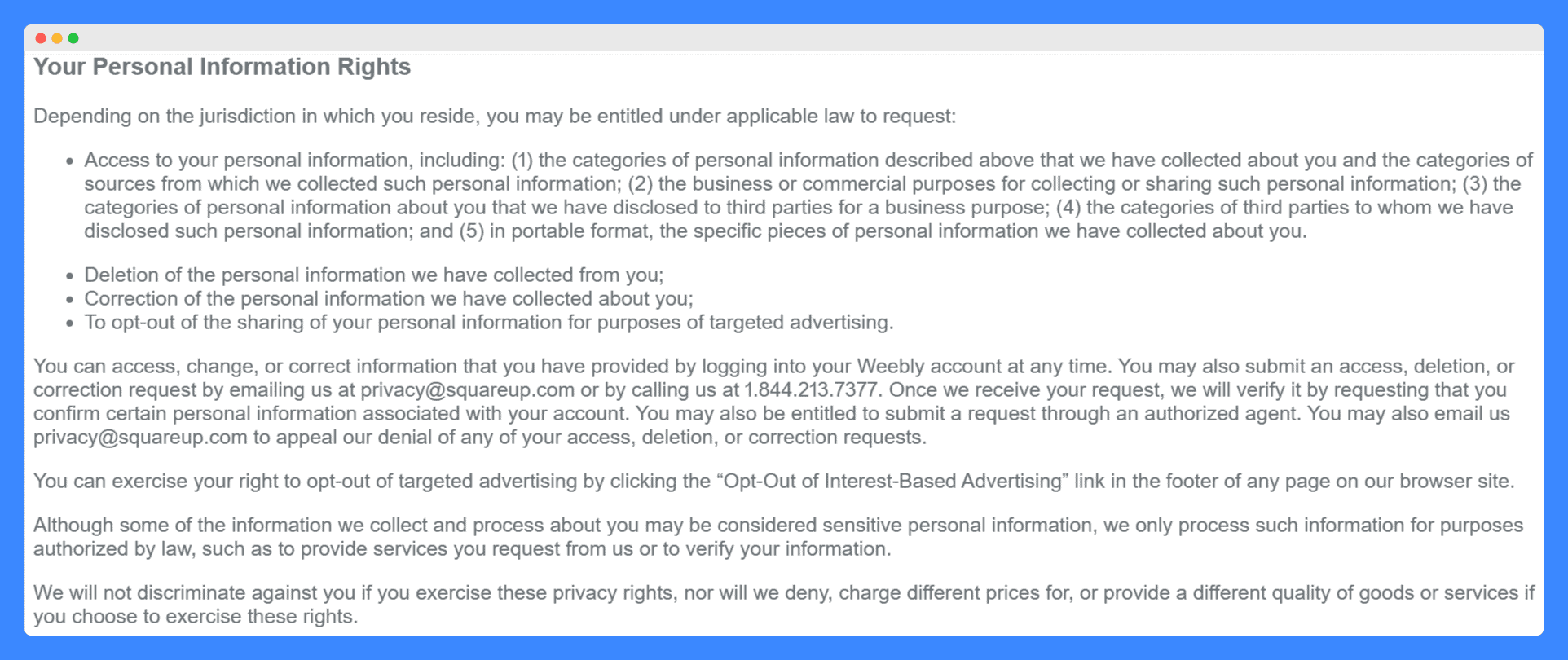
5. Coursera
Coursera integrates Google reCAPTCHA into its sign-up process to enhance user security by preventing bot activity.

In its privacy policy, Coursera addresses user rights under various U.S. state privacy laws, including access, deletion, and opting out of specific uses of personal data.
This supports reCAPTCHA’s data practices and shows Coursera’s commitment to transparency and compliance.

Where to Display Your Privacy Policy for reCAPTCHA?
Properly displaying a privacy policy reCAPTCHA to your website is just as important as writing it.
To ensure compliance with Google’s requirements and privacy laws, you need to make your privacy policy accessible, transparent, and user-friendly.
Here are the best practices for displaying your privacy policy:
- Footer of Every Page: Place a link to your privacy policy in the footer of your website, where users can easily find it.
- During User Registration or Sign-Up: If your website requires users to register or create an account, provide a link to the privacy policy on the sign-up form.
- On Forms Protected by reCAPTCHA: Include a short statement near any forms using reCAPTCHA, such as: “This site is protected by reCAPTCHA, and the Google Privacy Policy and Terms of Service apply.” This fulfills Google’s terms of service and ensures transparency.
- Cookie Consent Banners (if required): In regions governed by GDPR or similar laws, display a cookie consent banner that informs users about reCAPTCHA and links to your privacy policy. Include an option to allow or deny data collection before reCAPTCHA is activated.
- In the Website’s Navigation Menu: Add your privacy policy to a dropdown menu under “About Us” or “Legal.”
- Dedicated Privacy Policy Page: Create a dedicated, easily navigable page for your privacy policy.
- At the Checkout Page (if applicable): If your website involves e-commerce, display a link to your privacy policy at checkout. This is especially important since users are more concerned about data security when entering payment details.
- In Email Confirmations: Include a link to your privacy policy in transactional emails, such as order confirmations or registration welcome emails.
Making your privacy policy easily accessible shows users that you value transparency and take their data privacy seriously.
Frequently Asked Questions
What data does reCAPTCHA collect from my website visitors?
reCAPTCHA collects IP addresses, device information, and interaction data like mouse movements, and cookies to distinguish humans from bots.
Do I need to get user consent to use reCAPTCHA on my website?
Yes, in regions like the EU under GDPR, explicit user consent is required before reCAPTCHA processes any data.
Can I use reCAPTCHA without violating user privacy?
Yes, by ensuring transparency in your privacy policy and limiting data use strictly to its security purpose, you can remain compliant.
Do I need to mention reCAPTCHA in my privacy policy?
Yes, your privacy policy must disclose the use of reCAPTCHA, explain the data collected, and link to Google’s Privacy Policy and Terms of Service.
How can I update my privacy policy to include reCAPTCHA?
Add a section detailing reCAPTCHA’s role, and its data collection practices, and include links to Google’s required legal documents.
What is the difference between reCAPTCHA v3 and Invisible reCAPTCHA?
reCAPTCHA v3 quietly checks if users are real based on their behavior, while Invisible reCAPTCHA only shows puzzles if something seems off. JavaScript helps these tools work in the background by tracking simple actions like clicks and movements.



